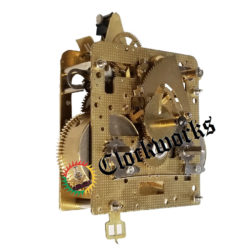How Does a Mechanical Clock Run?

Mechanical clocks have symbolized craftsmanship and engineering for centuries. Unlike modern battery-operated clocks, mechanical clocks rely on intricate mechanisms powered by energy stored in a wound spring or descending weights. Understanding how a mechanical clock runs enhances your appreciation for these timeless pieces and helps you maintain and care for them properly. In this article, we will explore the inner workings of a mechanical clock, discussing the key components that make it tick and providing tips on keeping your clock in top condition with products and services from Clockworks, Inc.
Mechanical Clock Functionality Explained: The Power Source
Every mechanical clock runs on a power source, typically provided by either a loop end mainspring, hole end mainspring or a set of weights. These components store energy and gradually release it to drive the clock's movement. In spring-driven clocks, the mainspring is a coiled piece of metal that stores energy when wound and releases it to drive the gears. In weight-driven clocks, gravity acts on descending weights to turn the gears and power the clock. Therefore, regular maintenance of these power sources becomes crucial. At Clockworks, Inc., we offer a range of high-quality replacement mainsprings and weights for various types of mechanical clocks.
Regular maintenance is essential not just for the power source but also for other critical components. By ensuring that the mainspring is wound correctly or the weights are properly set, you can prevent unnecessary wear and tear. This careful attention to maintenance extends the life of your clock, ensuring it continues to run smoothly for generations. Furthermore, understanding how these components interact can deepen your appreciation for the intricate engineering behind mechanical clocks.
The Gear Train: Transmitting Power
The gear train transmits the energy from the power source to the escapement and hands of the clock. Each gear in the train plays a critical role in dividing the energy and controlling the speed at which it is transmitted. The great wheel, the largest gear, rotates slowly and drives the smaller gears. The center wheel turns once every hour and connects to the minute hand, while the third and fourth wheels further divide the energy. Finally, the escape wheel, the final gear, connects to the escapement mechanism. Regular maintenance, including cleaning and oiling, keeps the gear train functioning properly and ensures accurate timekeeping.

The Escapement: Regulating the Clock's Timekeeping
The escapement controls the release of energy from the gear train, ensuring that the clock keeps accurate time. It consists of the escape wheel and a mechanism called the escapement anchor or pallet fork. The anchor escapement, the most common type, includes two pallets that interact with the escape wheel's teeth, allowing it to move forward in small increments. The escapement connects to a pendulum or balance wheel, which oscillates back and forth, regulating the clock's ticking. If your clock runs too fast or too slow, adjusting or repairing the escapement might be necessary. At Clockworks, Inc., we offer expert repair services to restore your clock's functionality.
The Hands and Dial: Displaying the Time
The hands of the clock, driven by the gear train, display the time on the dial. The hour hand moves around the dial once every twelve hours, while the minute hand completes a full rotation every hour. In clocks with a second hand, it typically makes a full revolution every minute. The hour hand connects to the center wheel via the cannon pinion, moving slowly to indicate the hour. The minute hand attaches to the center wheel's shaft, turning at a faster pace, while the second hand, if present, connects to the escapement. Clockworks, Inc. offers a variety of replacement hands and provides guidance on how to install them correctly.
Maintaining Your Mechanical Clock
Mechanical clocks require regular maintenance to ensure they continue to run smoothly and accurately. Depending on your clock type, it may need winding daily, weekly, or monthly. Consistent winding keeps the mainspring or weights functioning properly. Dust and grime can accumulate inside your clock over time, leading to increased wear on the gears and other components. Regular cleaning and oiling help reduce friction and extend the life of your clock. At Clockworks, Inc., we offer specialized cleaning kits and clock oil designed for mechanical clocks. Additionally, storing your clock in a stable environment, free from extreme temperature fluctuations, helps prevent unnecessary wear on the components.

Why Choose Clockworks, Inc. for Your Clock Needs?
At Clockworks, Inc., we understand the intricate craftsmanship that goes into every mechanical clock. We dedicate ourselves to helping you maintain and preserve your timepiece with our wide range of products and services. Whether you need replacement parts, maintenance supplies, or professional repair services, we have everything you need to keep your clock running smoothly. Our team of experienced technicians stands ready to assist you with any clock-related issues, from simple adjustments to complete restorations. We take pride in our attention to detail and commitment to quality, ensuring that your clock continues to function accurately for years to come.
Mechanical Clock Functionality Explained: Conclusion
A mechanical clock is a marvel of engineering, relying on the precise interaction of gears, springs, and escapements to keep time. Understanding how these components work together helps you appreciate the craftsmanship behind these timeless pieces and guides you in maintaining them properly. At Clockworks, Inc., we provide the products and services you need to keep your mechanical clock running smoothly, whether it’s a routine cleaning or a complex repair.
For more information on our offerings, visit our website at clockworks.com or contact us via email at clockworks@clockworks.com. Let us help you preserve the beauty and functionality of your mechanical clock for generations to come.

Updated on: 11/12/2024
Thank you!
